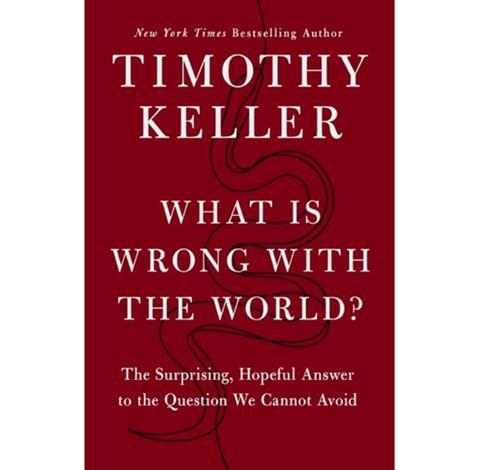A new collection of Tim Keller’s past sermons on sin has been compiled into new book What is Wrong with the World? It offers pastors and believers a biblical framework for understanding humanity’s fundamental problem, says our reviewer

In recent years much has been said of the incredible legacy Tim Keller left the church in his writings and sermons. The godly and faith-filled approach he took to his cancer diagnosis before his death in 2023, revealed the strength and depth of not just his faith, but that of his wife and long-time editor, Kathy.
It is Kathy who opens this book, introducing it as a collection of sermons on sin that her husband preached in the 1990s. She recalls the strong reactions these talks provoked at the time, quoting one listener who described sin as a “nuclear word” – reserved only for “the scum of the earth” such as “murderers, rapists, Nazis, and members of the KKK.” Yet, as Kathy rightly notes: “the need to explain sin in its many dimensions” remains as vital today as ever. That conviction led her and others to compile and edit these sermons into this new volume: What Is Wrong with the World? (Hodder & Stoughton).
Tim Keller excelled at explaining the Christian faith, and this book will act as a wonderful companion to pastors and preachers alike, as they seek to unpack biblical teaching about sin and connect this to any cultural context. Many UK churches have seen an influx of young people in recent months, with a desire for what has been coined ‘full-fat’ Christianity. Keller’s book provides exactly this, in his clear exposition of the nature of sin, our need for personal and corporate confession, and how repentance can lead to freedom and healing.
Keller makes a compelling case for why we need to understand and engage with our sin, beginning with uncomfortable questions we might sometimes ask ourselves: Why do we treat each other so badly? Why do we do such horrible things, such as genocide and murder? Why can we not live at peace with one another?
Keller’s answer to this is unashamedly theological. He thesis is that: “we will never be able to answer these questions unless we come to understand sin”.
His language is often stark – as in the opening chapter, ‘Sin as Predator’, or later, ‘Sin as Leprosy’. Yet Keller isn’t shock-mongering for effect. Instead, he remains faithful to scripture, using a biblical passage as the foundation for each chapter.
Beginning in Genesis, Keller draws on the story of Cain and Abel to uncover the hidden nature of sin – how it “crouches at the door” waiting to pounce. He then explores sin’s power to deceive (Sin as Self-Deception) and to spread (Sin as Leaven).

Each chapter ends with a prayer, revealing Keller’s pastoral heart and his conviction that grace is available to all. This helps soften what is, at times, a heavy read and enables deeper engagement on a personal level. A central theme of the book is the freedom that repentance brings, and the final two chapters – focused on the Healing of Sin – are an important inclusion. Here, Keller walks readers through Psalm 51, written after David’s adultery with Bathsheba, offering a process for moving from repentance into freedom. He outlines helpful four key stages: seeing your sin, confessing your sin, mourning your sin, and hating your sin. Keller reminds us that: “we follow Jesus because he’s the One who taught us that the repenting soul is the triumphant soul – that to lose our lives is to find our lives, and that we behold his grace and glory in the dark valley, not on the mountaintop.”
A hallmark of Keller’s communication has always been his cultural acuity and ability to draw on literary and popular references, alongside everyday anecdotes and analogies. In this book, those touches are especially important – they bring warmth and accessibility to material that could otherwise feel intense. Kathy and the other editors have done exceptionally well to let his voice speak clearly through each page, though a study guide with discussion questions would have been a helpful addition, allowing individuals and small groups to engage more deeply and apply the book’s challenging content to daily life.
What Is Wrong with the World? (Hodder & Stoughton) by Tim Keller is out now







































No comments yet